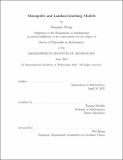Monopoles and Landau-Ginzburg Models
Author(s)
Wang, Donghao
DownloadThesis PDF (2.553Mb)
Advisor
Mrowka, Tomasz
Terms of use
Metadata
Show full item recordAbstract
In this thesis, we define the monopole Floer homology for any pair (𝑌, 𝜔), where 𝑌 is any oriented compact 3-manifold with toroidal boundary and 𝜔 is a suitable closed 2-form on 𝑌 , generalizing the construction of Kronheimer-Mrowka for closed 3-manifolds. The basic setup is borrowed from the seminal paper of Meng-Taubes. This thesis will be divided into three parts:
∙ Part I is concerned with the geometry of planar ends. We exploit the framework of the gauged Landau-Ginzburg models to address two model problems for the (perturbed) Seiberg-Witten moduli spaces on either C x Σ or H²₊ x Σ, where Σ is any compact Riemann surface of genus ≥ 1. These results will lead eventually
to the compactness theorem in the second part;
∙ In Part II, we supply the analytic foundation for this Floer theory based on the results from Part I. The Euler characteristic of this Floer homology recovers the Milnor-Turaev torsion invariant of 𝑌 by a classical theorem of Meng-Taubes and Turaev.
∙ In Part III, more topological properties of this Floer theory are explored in the special case that the boundary ∂𝑌 is disconnected and the 2-form 𝜔 is nonvanishing on ∂𝑌 . Using Floer’s excision theorem, we establish a gluing result for this Floer homology when two such 3-manifolds are glued suitably along their common boundary. As applications, we construct the monopole Floer 2-functor and the generalized cobordism maps. Using results of Kronheimer-Mrowka and Ni, we prove that for any such irreducible 𝑌 , this Floer homology detects the Thurston norm on 𝐻₂(𝑌, ∂𝑌; R) and the fiberness of 𝑌 . Finally, we show that our construction recovers the monopole link Floer homology for any link inside a closed 3-manifold.
This thesis is the compilation of the three arxiv preprints [Wan20a][Wan20b][Wan20c].
Date issued
2021-06Department
Massachusetts Institute of Technology. Department of MathematicsPublisher
Massachusetts Institute of Technology